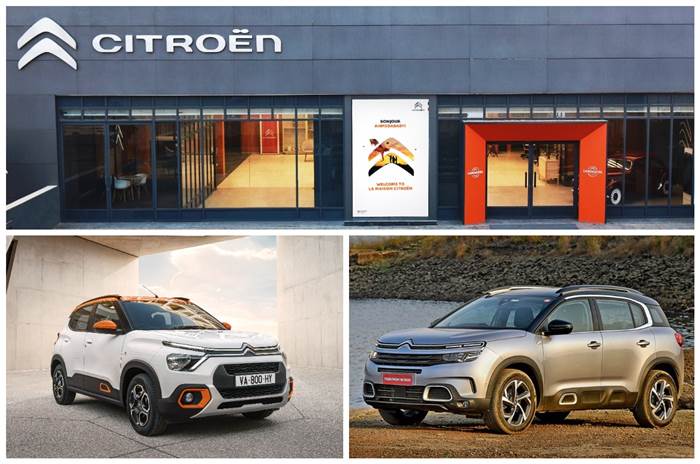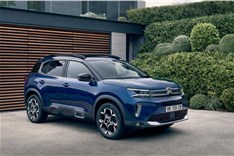Citroen is the latest automaker to foray into the Indian passenger vehicle market. While some other debutants in recent years – like Kia and MG – came in all guns blazing with massive manufacturing facilities, marketing blitz and products right in the heart of the market, the French brand has adopted a different approach.
- Citroen, Jeep to share supply chain, logistics and more
- Stellantis India not looking to increase production capacity yet
- It started with 10 dealerships; to expand footprint before the launch of the C3
It launched its flagship C5 Aircross SUV in April this year and only recently, unveiled its first product for the mass market segment – the new C3 hatchback, which is set to hit showrooms in 2022. Moreover, all of the company’s factories in India have been set up under a joint venture model, with an Indian partner. Commenting on Citroen's cautious approach, Roland Bouchara, MD and CEO of parent company Stellantis India, told Autocar India in an interview, "The market has never been so uncertain. This is why we need to be frugal and scalable.”
“Our approach has always been not to be a dinosaur or want something big.” Instead, the company intends to scale up gradually over the years. “We need to first execute and prove, and then move on. We need to stay humble in India,” stated Bouchara.
He added, “We are in India for a long time, and want to ensure that we will be sustainable from a profitability point of view.”
Perhaps, the group has also learnt from its past. Group company Peugeot already had a presence in the country in the 1990s, and there were also plans to relaunch the Peugeot brand here in 2011, which were ultimately called off. The auto conglomerate, then, seems to be treading carefully this third time around, to ensure a long term presence.
Citroen, Jeep to be frugal by sharing resources
Bouchara mentioned that Stellantis aims to achieve the lowest break-even point possible by being frugal. As such, it plans to synergise the working of both its brands present in India – Citroen and Jeep.
The most obvious point of commonality would be to build vehicles on a common platform. However, with PSA and FCA (Citroen and Jeep’s parent companies, respectively) having merged to form Stellantis only earlier this year, Bouchara said that it was too soon to be thinking about common architectures. However, he did hint at the global scope of such a move in the future. “There are many hypotheses and we are not talking only about India,” he stated.
We have already reported that we’ll see the first fruits of platform sharing between the companies with the upcoming Jeep compact SUV that will be built on Citroen’s CMP platform, however, that’s still some time away.
There are other areas where the group plans to save costs. “We are aiding efficiency by clubbing some activities [between Citroen and Jeep] that are common, like finance, supply chain, logistics, part warehouses and so on,” said Bouchara.
Interestingly, though a common building in Chennai houses PSA and FCA’s R&D centres, Bouchara mentioned that the R&D of the two entities will stay separate for now, because “we have enough on our plate to do.” Citroen is set to launch three new models by 2024, while Jeep will bring in two more SUVs by the end of 2022.
Still, with the prospect of platform-sharing in the future, there could be some cooperation at the R&D level moving forward. This is possibly also reflected in the fact that Partha Datta, the former President and MD of FCA India, was handed over the reins of heading R&D, engineering and design efforts of Citroen and Jeep in India and Asia Pacific, after the Stellantis merger.
Stellantis cautious about investment
Another area for finding synergies in India would be joint manufacturing operations between Citroen and Jeep. However, Stellantis’ country boss has ruled that out, for now.
Under a partnership with the CK Birla group, Citroen has a powertrain production facility in Hosur, Tamil Nadu, which can churn out 3,00,000 gearboxes and 2,00,000 engines per year. “With gearboxes, we are, more or less, already at full capacity. We are exporting to Europe, and are very efficient and profitable already. We will now start with engines,” elaborated Bouchara.
The French brand’s second venture with the same Indian partner is a vehicle assembly setup at Thiruvallur, Tamil Nadu, which currently handles the CKD operations for the C5 Aircross. Later this year, it will also commence production of the upcoming C3 hatchback. Citroen has sold a total of 473 units of the C5 flagship till end-September. But Bouchara seemed happy with the volumes and stated that the model is doing better than its “competitors”.
“Thiruvallur is a frugal approach. It’s not a greenfield facility, but we do have a plan for an extension,” he said. Though the plant is currently far from hitting its 60,000 unit annual capacity, the company already has plans to scale it up to 1,00,000 units.
Coming to Jeep, the American SUV specialist has a joint manufacturing facility with Tata at Ranjangaon, near Pune. Jeep’s current sales volume in India is quite modest, leaving plenty of idle capacity.
“We are in a development phase and have not earned maturity yet,” said Bouchara. As such, the group is not actively looking into common manufacturing operations for its brands in India, or setting up an all new facility. “At this stage, there is no reason to do a reshuffle,” he added.
The move seems to be prudent, especially in light of the recent, high profile exit of Ford from Indian manufacturing operations. Of the many factors that led to its demise in the mass segment, one of the most significant was setting up massive, and expensive, production facilities, even before establishing the appropriate sales volumes in the country.
Scalable dealer network
Foreseeing limited numbers for its debut model – the C5 Aircross – Citroen commenced its retail operations this year with just 10 dealerships across India. “Developing a network, along with volumes, is an ongoing task; but again, it is a scalable approach,” chimed in Bouchara.
However, to push out a mass market product like the upcoming C3, the company would need a deeper penetration into the market. “To develop the dealer network, you need to start 18 months in advance. So, we have already planned the second wave [of new dealerships], and even the third wave,” he said. As such, Citroen’s sales channel can be expected to grow in tandem with its volumes.
Moreover, Bouchara pointed out that the carmaker’s efforts to maximise localised content in its cars would benefit its aftersales services. “Since we are localised, the parts will be made in India and, hence, won’t be expensive.” He added, “Secondly, we have innovated with ‘service-on-wheels’. All our dealers will provide the service. And it’s not just a little van, but a workshop that is always going to be on the road.”
Also see:
Jeep confirms electric axle for 4X4 compact SUV
Citroen C3 is a ‘hatchback with a twist’, says company CEO
Made-in-India Citroen C3 not a replacement for European model







Comments
Member Login
Personal Details
No comments yet. Be the first to comment.